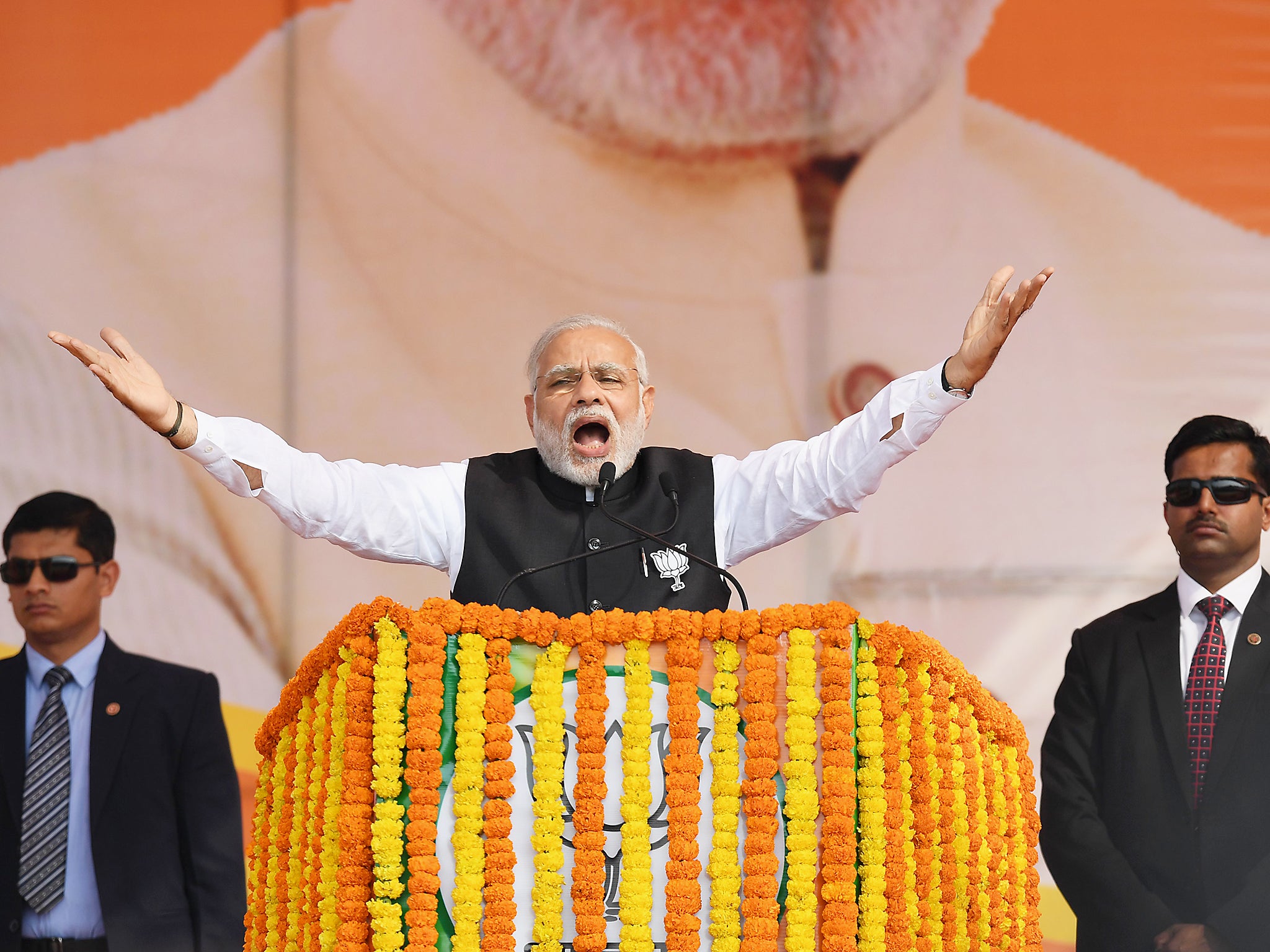The Independent's journalism is supported by our readers. When you purchase through links on our site, we may earn commission.
Trump is tame compared to India's newly strengthened prime minister Narendra Modi
Modi’s party came to power after several of its members tore down a mosque in 1992. Since then it has banned 11,000 foreign NGOs from India and incited religious hatred that led to thousands of attacks on Muslims and lower-caste Hindus for disrespecting cows


Long before Trump and his clones in Europe got near power, right-wing populism already had a pioneer, in India. In 2014, Narendra Modi became Prime Minister and crushed the Congress Party with a campaign that put Trump’s race-baiting to shame.
In new state election results out this week, Modi not only cemented that majority but extended it. His party won an overwhelming victory in India’s most populous and politically important state Uttar Pradesh. The margin of victory was especially surprising since the economy has been in doldrums and was barely recovering from a “currency chaos” when Modi abruptly annulled the vast majority of banknotes in a bid to tackle corruption.
As Bloomberg’s Mihir Sharma put, he is now India’s most powerful leader in two generations. Worse, he is well on his way of turning India into a Hindu nationalist state. The world’s largest democracy is now the world’s largest playground for right-wing populism.
So how did Modi become so powerful? And how is he turning India into a Hindu nationalist state? The story predictably starts with a weak opposition party. Congress is being led by Rahul Gandhi and controlled by the Gandhi clan, who are as incompetent as they are inept. Gandhi has neither the personality, nor the vision, nor the hunger for leading the country.
Narendra Modi, like most populists, conducts politics as an act of constant war, not a matter of administration. He is hyperactive – constantly dreaming up new slogans and initiatives – occupying so much of the political landscape himself that his opponents cannot even get heard.
But the primary weapon Modi deploys to polarise his audience and stun opponents is stoking up religious tension. Even before the general election his allies said critics should live in Pakistan instead of India and threatened to evict Muslims from “Hindu areas”. But the concerted strategy of radicalising Hindus and turning them against other minorities doesn’t stop there. In fact it only escalated after his election.
The following year the BJP started stoking up hysteria against Muslims and low-caste Hindus for not sufficiently respecting cows. Hindu mobs started attacking and lynching Muslims and low-caste Hindus for apparently eating beef – without evidence – on a regular basis. Cows were even used for BJP leaflets until the electoral commission stepped in.
Violent Hindu nationalism isn’t just the BJP’s crutch during elections – it is embedded in its DNA. The party came to prominence in the 90s after it turned the destruction of a mosque into a political rallying cry. But its targets have also included Christian groups, who they accuse of forcibly converting Hindus to Christianity. Violence against Christians escalated so much that last year that US lawmakers wrote to Modi expressing their alarm.
Like all aspiring autocrats the Prime Minister of India also shuns criticism. His government has banned around 11,000 foreign NGOs, many of them small charities helping the poorest, over petty administrative rules. Many of those banned also included groups like Greenpeace, which has frequently opposed environmental policy. At home, opponents are dismissed as anti-Indian and an ancient law against “sedition” is being increasingly used by allies against them.
But Modi’s underlying strength comes not from his policies, hate-mongering or his frenetic activity. It comes from his ability to tap into the deep desire of Indians to be taken seriously on the international stage. To make them feel proud of their identity. He carries himself with the kind of swagger and confidence opponents can only dream of. He makes Indians believe he can make India great again. He sold that vision before Trump even thought of running for President.
It is for this reason he continues to defy political gravity. He is able to make Indians believe he is on their side even if his policies cost them dearly. When his government withdrew most Indian currency from circulation in November, the result was chaos and caused immense hardship to the poorest. But because it was sold as a strike against corruption, Indians bought it. In fact they gave him extra credit for trying. As the Hindustan Times editor Bobby Ghosh points out, Modi’s victory this week was more notable than the one in 2014.
The only way to stop right-wing populists is to expose the emptiness of their promises. Modi’s biggest challenge remains that he hasn’t delivered a faster economy and more jobs. In the meantime, India’s religious minorities have become more polarised and fearful for their future. The secularist ideals the country was founded on are being challenged like never before.
The problem for his opponents is that Modi’s strength remains so overpowering that the shine may take years to come off. The damage to Indian democracy and ideals may take even longer to heal.
Join our commenting forum
Join thought-provoking conversations, follow other Independent readers and see their replies
Comments
Bookmark popover
Removed from bookmarks